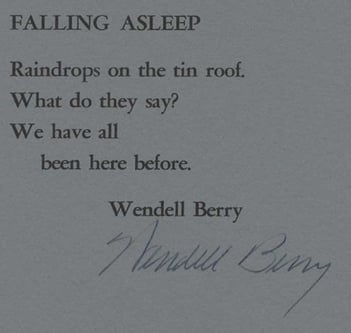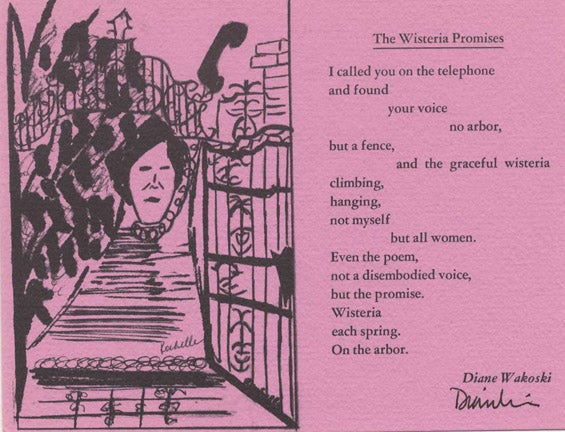For a healthy discourse, voices from all across the country are needed. These distinctions occur not just along the lines of race and gender, but class and region as well. Much of literature and cultural taste, like the forces of political change and economics, are dictated by those in the cities, leaving behind those in rural and farming counties. One of the most important literary voices of rural America today, telling the stories and bringing to light the issues of a forgotten region, is Wendell Berry, an author of poetry, fiction, essays, and more.
 What distinguishes Berry’s talented, over half-century-long career is his sincere commitment to activism. Since the late '60s, when Berry was a professor and incipient writer, he protested the war in Vietnam. Berry has put his opposition to nuclear power plants, and his support behind small farmers. Berry still lives in Port Royal, Kentucky, on a farm he moved to with his family in the '70s. His experience on the farm has given richness to his vision for a better future and has bestowed authority to his sympathetic calls for an America that stays in touch with the land and agrarian culture that is integral to its character.
What distinguishes Berry’s talented, over half-century-long career is his sincere commitment to activism. Since the late '60s, when Berry was a professor and incipient writer, he protested the war in Vietnam. Berry has put his opposition to nuclear power plants, and his support behind small farmers. Berry still lives in Port Royal, Kentucky, on a farm he moved to with his family in the '70s. His experience on the farm has given richness to his vision for a better future and has bestowed authority to his sympathetic calls for an America that stays in touch with the land and agrarian culture that is integral to its character.
As the country’s urban-rural divide has shown itself to have ever-growing and serious consequences, Berry has emerged as a sympathetic, assertive voice for the region. Berry is an especially necessary figure in the current American literary community, in a time when most of the author bios on recent hardcovers seem to contain the sentence “... lives in Brooklyn.”
Berry has been around long enough to know the changes that have affected the land, culture, and economics of the rural United States. It is no surprise he has been treated lately as something of a guiding voice or rural prophet. A documentary about his life and work, Look & See, is in theaters now. Recently, in The New York Review of Books, he took to defending rural and Southern Americans from the stereotyping and characterization writers often cast over them. Yes, these regions are home to vicious manifestations of racism, sexism, and xenophobia, but they are far from monolithic or defined by their worst vices. To create a democratic future worth living in, Berry argues, we must factor in the wider context of neglect and exploitation that defines rural America. “Rural America is a colony, and its economy is a colonial economy,” Berry wrote this spring. “The business of America has been largely and without apology the plundering of rural America, from which everything of value—minerals, timber, farm animals, farm crops, and ‘labor’—has been taken at the lowest possible price.”
 Like fellow Appalachian writer Ron Rash, Wendell Berry believes in progress, but he knows it cannot come without empathy. He knows that you cannot advise or influence a people as an outside scold, that if you are to attempt to repair the vices of a people you must take the time to understand the values and virtues they hold. Berry has long understood those seismic cultural shifts—the disappearance of small farms, increased pollution, the loss of rural industry—that come with massive repercussions that require confrontation. (His prescient book, The Unsettling of America, about the consequences of farm loss, came out all the way back in 1977.)
Like fellow Appalachian writer Ron Rash, Wendell Berry believes in progress, but he knows it cannot come without empathy. He knows that you cannot advise or influence a people as an outside scold, that if you are to attempt to repair the vices of a people you must take the time to understand the values and virtues they hold. Berry has long understood those seismic cultural shifts—the disappearance of small farms, increased pollution, the loss of rural industry—that come with massive repercussions that require confrontation. (His prescient book, The Unsettling of America, about the consequences of farm loss, came out all the way back in 1977.)
 Solving these problems involves doubling down on practices from the past, such as a renewed focus on small farmers who work and pay attention to the health of the land and the soil. It involves respecting fellow citizens who live in rural America, who deserve to be regarded by politicians and by the people they feed, whom they give resources and energy to. At the same time, Berry does not sentimentalize history, or think there is some lost Eden on the horizon of the American past. As he says of his cycle of short stories concerning the inhabitants of the fictional town of Port William, Kentucky, “If your work includes a criticism of history, which mine certainly does, you can't be accused of wanting to go back to something, because you're saying that what we were wasn't good enough.”
Solving these problems involves doubling down on practices from the past, such as a renewed focus on small farmers who work and pay attention to the health of the land and the soil. It involves respecting fellow citizens who live in rural America, who deserve to be regarded by politicians and by the people they feed, whom they give resources and energy to. At the same time, Berry does not sentimentalize history, or think there is some lost Eden on the horizon of the American past. As he says of his cycle of short stories concerning the inhabitants of the fictional town of Port William, Kentucky, “If your work includes a criticism of history, which mine certainly does, you can't be accused of wanting to go back to something, because you're saying that what we were wasn't good enough.”
For years, there has been a sense of American comfort sufficient enough to excuse many writers from talking politics. At the same time, there have been plenty who have spoken and tried to get our attention, who saw the problems and shifts as they were beginning and growing. But the problems they spoke of were distant, and failed to capture our attention. It is our supreme loss as readers and citizens if we choose to ignore Wendell Berry, and if we continue to ignore those who already exist and will take his place.









